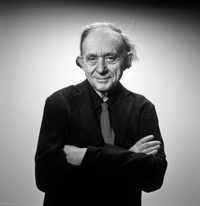
Frederick Wiseman, Documentary Filmmaker
Documentary filmmaker Frederick Wiseman uses the “direct cinema” tradition of documentary filmmaking—continued filming of human conversation and the routines of everyday life with no music, interviews, or voice-over narration—to powerfully examine social institutions in America. First trained as a lawyer, Wiseman began his filmmaking career in 1967 with a series of groundbreaking films broadcast on PBS. The so-called “institutional series” included Titicut Follies, which examined life in a prison for the criminally insane in Bridgewater, Massachusetts, as well as High School; Law and Order; Hospital; and Welfare. Wiseman’s later works include Domestic Violence; State Legislature; and Zoo. He has been awarded two Emmy Awards, the Career Achievement Award from the International Documentary Association, a Guggenheim Fellowship, and a MacArthur Fellowship.